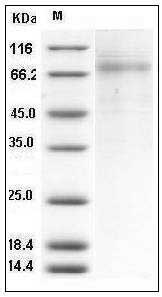-
Product Name
Human PLTP (His Tag) recombinant protein
- Documents
-
Description
Facilitates the transfer of a spectrum of different lipid molecules, including diacylglycerol, phosphatidic acid, sphingomyelin, phosphatidylcholine, phosphatidylglycerol, cerebroside and phosphatidyl ethanolamine. Essential for the transfer of excess surface lipids from triglyceride-rich lipoproteins to HDL, thereby facilitating the formation of smaller lipoprotein remnants, contributing to the formation of LDL, and assisting in the maturation of HDL particles. PLTP also plays a key role in the uptake of cholesterol from peripheral cells and tissues that is subsequently transported to the liver for degradation and excretion. Two distinct forms of PLTP exist in plasma: an active form that can transfer PC from phospholipid vesicles to high-density lipoproteins (HDL), and an inactive form that lacks this capability.
-
Protein name
Phospholipid transfer protein
-
Protein short names
PLTP; OD107; RP23-61O3.5; LIPID TRANSFER PROTEIN II; HDLCQ9
-
Uniprot ID
P55058
-
Gene Name
PLTP
-
Source/Expression Host
Human Cells
-
Expression Plasmid/cDNA
A DNA sequence encoding the human PLTP isoform 1 (P55058-1) (Met 1-Val 493) was expressed, fused with a polyhistidine tag at the C-terminus.
-
Protein Species
Human
-
Molecular weight
The secreted recombinant human PLTP consists of 487 amino acids after removal of the signal peptide and has a predicted molecular mass of 54.5 kDa. As a result of glycosylation, the apparent molecular masss of rh PLTP is approximately 70-80 kDa in SDS-PAGE under reducing conditions.
-
Purity
> 80 % as determined by SDS-PAGE
-
Validations

Human PLTP Protein (His Tag) SDS-PAGE
Related Products / Services
Please note: All products are "FOR RESEARCH USE ONLY AND ARE NOT INTENDED FOR DIAGNOSTIC OR THERAPEUTIC USE"
